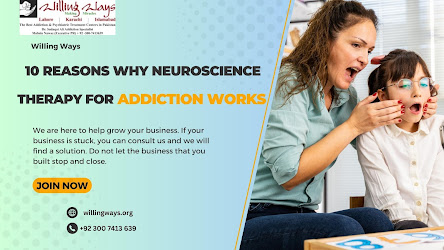What is Neuroscience Therapy?
This therapy presents a new dimension and approach to addiction. As this alternative addiction therapy is explored, more reasons are recognized for how it can be beneficial to struggling addicts. For those seeking the best addiction treatment center in Pakistan, this innovative approach offers new hope and potential for effective recovery. There are a lot of misconceptions about addiction, but neuroscience presents a different perspective, one that makes a lot of sense. Further research on this treatment can potentially lead to more effective treatment methods.
Realizations Leading to the Viability of
This Treatment
Addiction in
society is more common than you think. But more often than not, addicts are
thought of as less than they are. However, recognizing the importance
of adolescent grief treatment sheds light on the unique challenges
faced by young individuals coping with loss and addiction. Adolescents
experiencing grief require specialized care and support to navigate the
complexities of their emotions and recovery process. With this said, below are
some eye-openers about addiction and the people affected by it, as presented by
neuroscience.
Addiction is in the subconscious
It is
important to understand that dependence on a certain substance is affected by
the neurochemical dysregulation that occurs in the Mesolimbic Dopamine System
or MDS. Recognizing the symptoms
of Ritalin addiction further emphasizes the need for a comprehensive
understanding of addiction and its impact on the brain. By identifying the
signs of Ritalin addiction, healthcare professionals and individuals alike can
take proactive steps toward early intervention and effective treatment. When
there is a continuous use of drugs that affects the MDS, it eventually leads to
changes that, in turn, affect the nerve function or a process called
neuroadaptations. Addiction causes brain disease, and understanding
this hidden truth explained by experts in the field is crucial. With
further exposure, a threshold is reached, and that results in compulsive use.
In other words, willpower and decision-making become impaired.
Numerous factors are at play, including
genetics
A person
does not simply cave into temptation and lose it. Abnormalities in genetics,
environmental factors, and exposure to drugs, alcohol, and other substances may
result in addiction.
The brain is very much involved in the
experience.
Substances
affect the brain chemicals. This is what incites pleasure and positive feelings
when the substance is taken. With prolonged usage, nerve function is very much
involved.
Addiction can start with pleasure
Most addicts
begin using substances because of the buzz or high they get out of it. But
addiction is not all about pleasure. Although pleasure can be a motivating
factor to use, continuous and excessive consumption diminishes the euphoric effect
over time. Instead of seeking pleasure, individuals may develop a compelling
need and uncontrollable craving for the substance. Is Ketamine
the future of depression therapy? Understanding these underlying
dynamics is crucial in comprehending the complexities of addiction and
exploring innovative approaches to treatment.
Everything can change, including the brain
Nothing is
fixed. The brain always responds to events, actions, and experiences. In other
words, the brain can be rewired to create a new set of experiences. So, despite
the genes and neurons being coded for addictive behavior, it can still be
altered. It simply means there is hope for recovery. This revelation offers
hope for recovery and opens the door to various therapeutic interventions. Treatment
of depression, for instance, plays a significant role in reshaping
neural pathways and fostering positive changes in the brain. By addressing the
underlying causes of addiction and implementing tailored treatment plans,
individuals can embark on a journey of healing and transformation.
The brain is active in the process
The brain
never gets stuck. Neural networks are always in the works to be responsive to
many different life experiences. And this is why an effective counseling
approach is essential for an addiction program to take its full course.
Addicts are not helpless
While it is
said that addiction does not necessarily happen in the subconscious does not
mean addicts are powerless. As a matter of fact, their conscious effort does a
great deal for their successful recovery.
Behavioral therapy can be effective
With the
help of behavioral therapy, brain chemistry can be successfully changed in a
similar way that medications take effect on a positive change.
More hope for alternative addiction
therapy
The
alternative therapy method, as clarified by Neuroscience, can lead to a deeper
understanding of what addiction is all about. And that can lead to further
developments in chemical and substance dependence.


Comments
Post a Comment